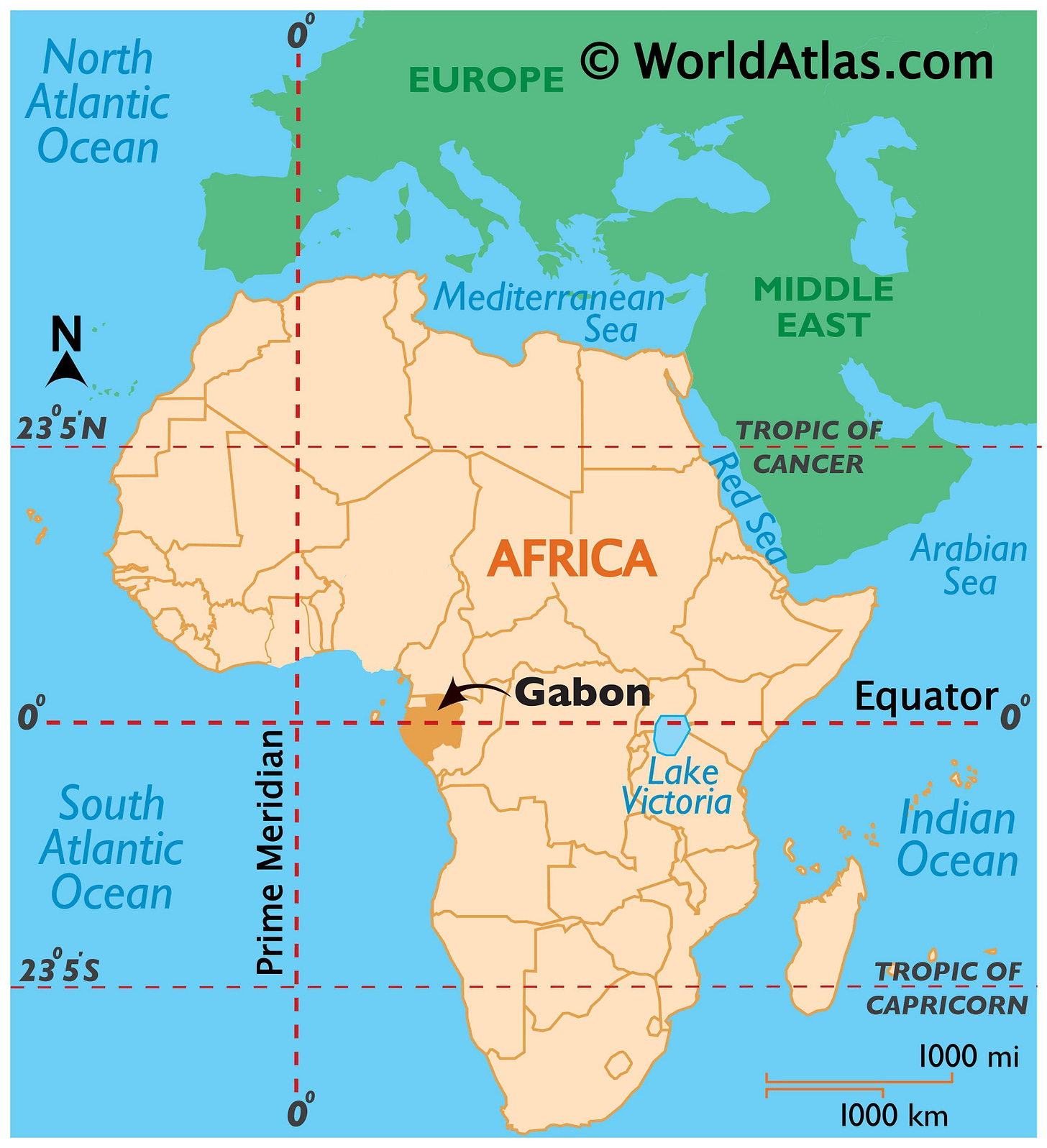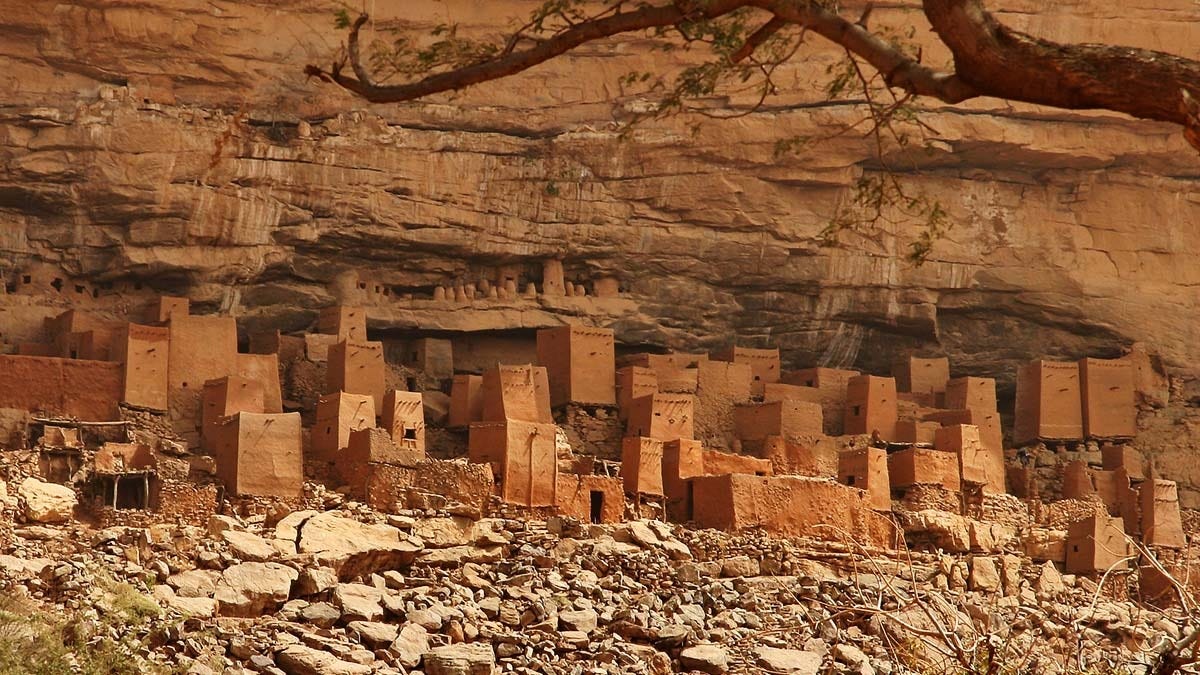Gabon's success story & the "joking kinship"
The invisible power of industrial platforms & wht it's so funny to be African ❤️
Good morning friends!
I’m testing a new format: sharing two (or more) topics that got me obsessed over the week.
This week’s meal is made of:
Gabon’s success story, or the invisible power of industrial platforms
The “joking kinship”, or why it’s so funny to be African
Lessgò.
Gabon’s success story 🪵🪜
Cut in half by the equator, Gabon is a very small - & unique - country:
2.3M people, with a 90% urbanization rate (highest in Africa) 🏙️
88% of the land mass is covered by tropical forest 🌳
85% of its exports are either crude oil or manganese (2nd producer of manganese after China, just sayin’) 🛢️
among the highest GDP per capita ($19,834 PPP) and HDI (0.7) in Sub-Saharan Africa.
Pretty nice outlook, right?
But Gabon has a big problem.
It can boast the continent’s largest biodiversity and best economic indicators, but the truth is that 1/3 of the population lives in poverty, and unemployment is at 20%.
If tomorrow's global oil price drops by 30% (as it happened in the 1980s), the country might have to ask for an IMF bailout!
The country looks good at first glance, but the truth is that the economy needs diversification, its people need jobs, and its leadership a revamp (ops 🫢).
Luckily, Gabon had a plan!
In 2010, two important things happened:
The country banned the export of raw wood in the form of logs to accelerate its local processing capacity;
The country created the first Special Economic Zone in Central Africa - Gabon Special Economic Zone (GSEZ), in a joint venture with Olam and Africa Finance Corporation (AFC).
Now, why does it matter?
A Special Economic Zone is a designated area within a country where business and trade laws differ from the rest of the nation, typically to attract foreign investment and boost economic activity.
In practice, it is a plot of land with ZERO taxes and ZERO customs duties on imports.
Given the importance of the wood industry in the country, the ban on the export of raw wood logs meant that local processing capacity needed to be scaled.
A 33-year-old Indian accountant is called to arms - all the way from New Delhi - to lead the joint venture. His name: Gagan Gupta.
The goal? Strengthen the existing “filière” around wood processing, attracting enough investments to achieve economies of scale.
The site for the Special Economic Zone is 1,100 hectares of land in Nkok, 27km from Libreville (Gabon’s capital), and it’s meant to provide all the infrastructure needed for large-scale production: power plant, railway, warehouse, logistic park, residential units, water treatment plant, etc….
Ambitious goals, ambitious leader. Fast forward 15 years, the GSEZ is the most successful and praised industrial experiment in Sub-Saharan Africa. The company claimed to have an active of:
16,000 jobs created
$265M worth of exports each year
$1.7B attracted
Young Gagan Gupta proved to be a capable leader, and in 2018 the joint venture model of the GSEZ was rolled out in other countries under a new entity: Arise IIP.
The goal of the company? Identify industrial gaps in African countries and invest in the local transformation of raw materials - along with the creation of special economic zones.
The ultimate desired outcome? Boost industrialization, local jobs, and high-quality exports in Africa.
Up to now, they’ve opened shop in two other African countries:
in Benin, with the Glo-Djigbé Industrial Zone (GDIZ), focused on agro-processing and textiles;
in Togo, with the Adétikopé Industrial Platform (PIA), focused on the local transformation of premium quality cotton to export it globally.
And they won’t stop here.
They’ve already signed public-private initiatives with other 7 African countries (Rwanda, DRC, Chad, Congo, Nigeria, Sierra Leone & Côte d’Ivoire).
Now, this is what I call blitz-scaling.
My 2 cents?
I think what they’re doing is cool. We’ve finally seem to have cracked a replicable, scalable model for the local transformation of raw materials in the continent.
However, we need time and independently verified data to assess the impact these guys are having on African economies.
For example, when we look at the Observatory of Economic Complexity, Gabon’s wood sector exports (sawn wood, veneer sheets, plywood) amounted to $550M (7.4% of total exports) in 2010.
In 2022, they reached $700M (9% of total exports).
A leap forward, but not mind-boggling numbers for 12 years of GSEZ activity. What do you think?
I remain bullish on the approach, especially when I see the ambition of the projects they have in the pipeline, which is simply du jamais vu on the continent so far.
The “joking kinship” 👨🏽🦱👧🏽
I’ve been staying in Abidjan, at my uncle’s place, for a month now.
I love the vibe: people in and out of the house, loud music and loud TV, a lot of laughter, and a lot of boredom.
My new platonic crush is called Fatim, and she’s from Mali.
Specifically, she’s from a city called Mopti, located in the famous Bandiagara Escarpment, the land of the Dogon people.
She herself is a Dogon.
The Dogon are quite a mystical people, known all over the world for their knowledge of the stars.
(Did you know that Matthew McConaughey once lived among them and wrestled with local fighters? So random!)
There is another interesting fact about the Dogon: they have a very special relationship with the Bozos (another ethnic group).
What type of relationship?
They can insult each other in the worst ways, without any repercussions.
If a Dogon meets a Bozo, they can start accusing them of being “thieves”, or “slaves” out of nowhere. They can even go as far as attending a funeral of a Bozo and make fun of the deceased (this is what happened, apparently, at the funeral of the burkinabé general Aboubacar Sangoulé Lamizana).
This phenomenon has been studied by anthropologists, who have given it a specific name: la parenté à plaisanterie, literally, ‘the joking kinship.’
It is a social practice that demands members of two allied groups to make fun of or insult each other, without consequence. Symbolic interactionism in its most intense form.
The funny thing is that my own ethnic group, the Dida, has the same kind of relationship with the Abbé people.
The oral tradition goes that there was once a long and bloody war between Dida and Abbè, until peace was finally achieved on the shores of the Bandama River, and it recites:
“Never again shall a drop of Abbé’s blood be shed by a Dida’s hand”
“Never again shall a drop of Dida’s blood be shed by an Abbé’s hand”
A very strong alliance was formed, which lives by through repeated instances of “joking kinship”.
I’ve seen my uncle insulting random people on the streets, only to find out later that they were Abbés. And there’s more: a group of Abbé interrupted the funerals of my grandad, accusing the participants of having “killed their brother”. They did not leave until several bottles of liquor and a generous sum was given to them.
The joking kinship can also be a good source of inter-ethnic income redistribution 😂
My ex-girlfriend was an Abbé. We were both raised in Europe, so we didn’t know our ethnic groups had a history.
One day, I was having a beer at a local maki with my uncle.
At one point he asked me: “You told me that your girlfriend is also Ivorian right?”
“Yes”
“Well, what ethnic group does she belong to?”
I didn’t know, so I asked her.
“Abbè”, I answered.
“Aaaahh aaaahh aaaaaaaaahhh”: the table literally exploded. For a good 10 minutes, everyone around me was screaming and laughing.
From that moment on, the night was filled with comments and jokes I didn’t understand.
I was so confused and entertained.
Deep inside me, I was like “It’s so cool to be African”.
That’s all folks!
Coming soon with new stuff on African tech, culture, history, and random sh*t.









